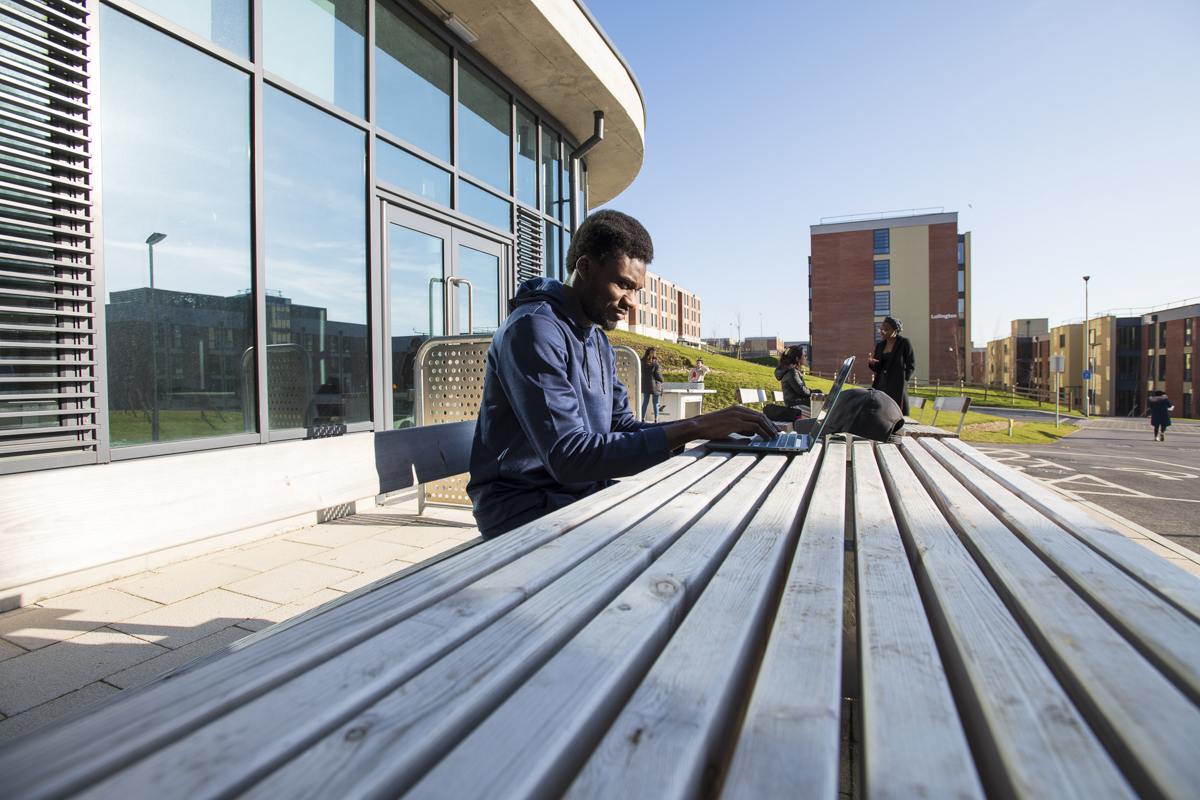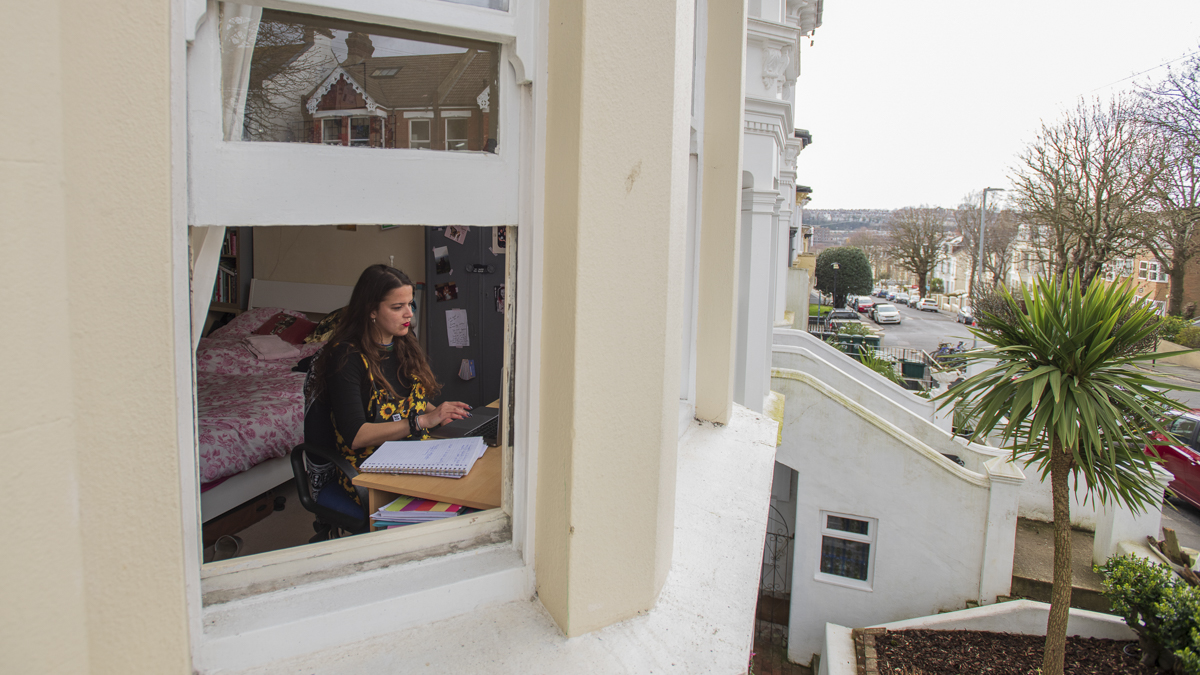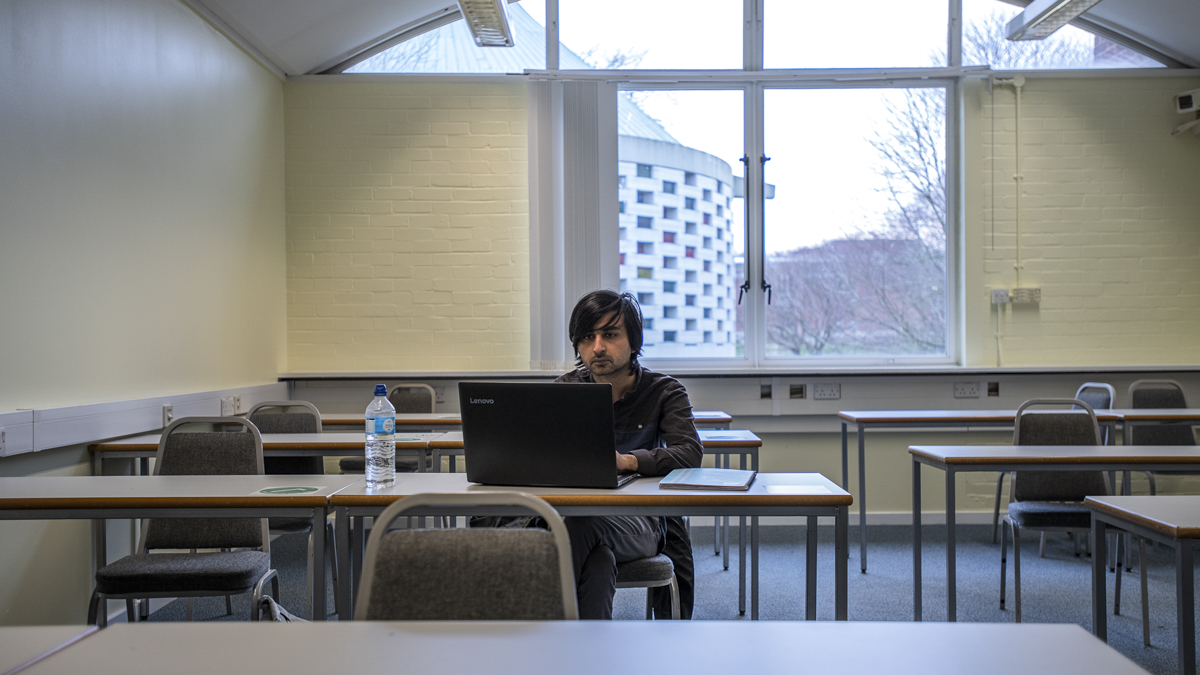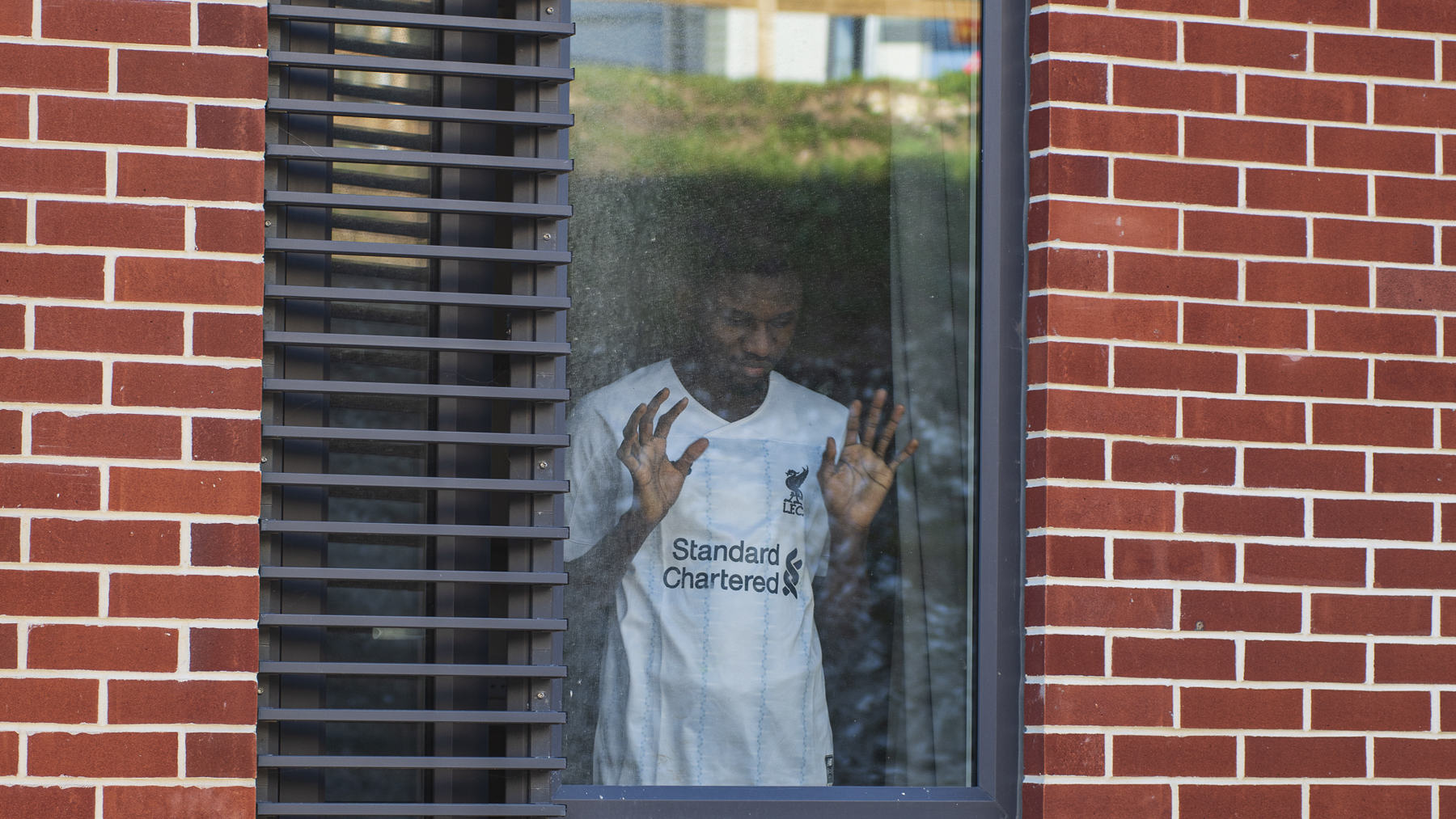International student Abdullahi Aliyu has been stuck in his room due to lockdown restrictions since September when he resumed studies in the U.K.
ARTICLE BY AKINTUNDE BABATUNDE
PHOTOS BY TUNDE ALABI-HUNDEYIN II
In March 2020 when the COVID-19 pandemic first forced total lockdown in most countries, many universities around the globe stepped up to deliver new models for emergency remote learning, the United Kingdom included.
A year later, international students in U.K. universities are evaluating their experiences with online learning and calling for more support from their universities and the government.
Some of the students who have been stuck in their dorm rooms with online classes since last September spoke with Anthrow Circus, expressing the challenges of online learning. They appealed to the government to consider their mental health due to the fatigue of learning online with no opportunity to socialize and make the best of their academic year.
Some of these students have traveled from far countries and had expected cutting-edge training from world-class British institutions with opportunities for in-class learning and practical training in science labs, media studios, and theaters. They are disappointed at instead having to sit in front of computers all day in Zoom classes. Due to coronavirus-related restrictions, they are unable to apply for jobs, thereby leaving them financially stranded. Some have had to resort to food banks to be able to feed themselves.

Some students seize the opportunity to study outside their rooms when the U.K. weather is favorable.
Difficulty setting up life in the U.K.
Abdullahi Aliyu, a law student from Nigeria, observes that he has been stuck in his room for the past six months since he arrived in the U.K. for his master’s program, adding that his university experience has been boring because of the learning restrictions.
“We paid large sums of money to get here. The government should have ensured that a smooth transition was available for us to be able to settle in. It took me about two months to open a bank account. How was I expected to conduct transactions?” Aliyu laments.
Manevasoa Christina Boda from Madagascar is studying at Newcastle University and says that it has been difficult to socialize and properly connect with new people now that all social events are online.
“If I want to meet new people through social events, they are mainly run online, and the interactions last for the duration of the Zoom meetings. Once the meetings end, we rarely see the same faces again. Overall, social interactions and events have become too rare, structured, and unnatural this year, which makes it more challenging for an international student who is experiencing the U.K. for the first time,” she complains.
Taio Gardey, studying international development at the University of Manchester, expresses his frustration with the unending lockdowns.
“I came from Argentina and I am used to big spaces, green places, and a lot of sunshine. This is exactly the opposite here in the U.K. Since November, we haven’t seen the sun, every day it rains, and if you are lucky, it at least snows.” He argues that the university should ensure that “students have access to the university facilities when lockdown ends. All students have lost an important aspect of the student life. We need to experience what it feels [like] to be international students in the U.K. before we return to our countries.”

Emma Bouterse is concerned about the lack of practical training, a critical component of her course. “I am kind of feeling alone and wondering if I am actually studying media practice,” she acknowledges.
Mixed experiences
For Itunuoluwa Awolowo, a Nigerian studying for an MBA at Sheffield Hallam University, online classes have impacted her life both negatively and positively.
“At the start of the semester, online classes were a bit difficult for me. I had a lot of distractions, and it was difficult for me to concentrate in class compared to being in a school environment.” However, she says that as she accepted this would be the state of things for months to come, she adopted new strategies and disciplined herself in cutting off the distractions that came with going to class in the comfort of her own room.
Meanwhile, Emma Bouterse, from the Netherlands, has been in the U.K. for about three years. Currently studying media practice for development and social change at the University of Sussex, she says online classes have not been the best experience for her. According to Bouterse, any student who needed practical media training with no prior capacity would struggle just as she is.
“I have no media practice experience before joining this course, so I really hoped to learn more than what we do at the moment. I do think staff really try hard to facilitate online learning in a practice-based course, but it is very different from the facilities that we are supposed to have access to.”
“I think the main challenge is not being able to access equipment, not being able to learn more with professional technology, and also I am kind of feeling alone and wondering if I am actually studying media practice.”
On jobs
Bouterse is one of the lucky ones who got enrolled on the furlough scheme, which was set up by the U.K. government to pay part of the monthly wages of workers who cannot work due to lockdowns imposed since last year.
“I was quite lucky that I had a part-time job in a café before lockdown, so I get paid 80% of the 20 hours per week I used to work.” Many self-funded international students must work multiple jobs to be able to cover their living expenses and tuition. But since the lockdowns began, job opportunities have not been available for students, further exacerbating their academic and mental health challenges.

“I think for me, it’s been a financially bad decision to come to the U.K.,” confesses Haris Jamil, who complains about the discriminatory tuition fees paid by international students in the U.K.
Much higher tuition than home students
Haris Jamil, a Pakistani third-year student studying international development at the University of Sussex, expresses concerns that it has been difficult to pay tuition while not getting the best learning experience this past year.
Like other international students, Jamil’s tuition fees, which were £15,600 (around $21,500) when he started his program, increased in 2020—to over £16,000. He explains that “the biggest concern is that they even increased it this year, in the period of COVID when learning has been online.”
“I think for me, it’s been a financially bad decision to come to the U.K., to be honest, because not just am I paying so much but the pound per rupee ratio has gone double, so I am paying double of what I was paying in the first year.” He says that he has not been getting value for his study abroad experience this year, having been stuck in his room, taking lectures via Zoom, with a culturally tilted mental health support system, while still paying nearly double the fees of home students who pay around £9,000. “It’s kind of a discrimination,” he argues.
When asked if he’s aware of any or benefited from any university support for international students, Jamil says the support the university gave students during the first lockdown was better than what they’re providing now.
“The university is not providing any support at the moment compared to the last lockdown that we had. During the last lockdown, the university was providing food parcels, but now even though there is a food bank, the university is not funding it properly according to the current needs of the students.”
“Students who are living on campus are already facing a financial crisis.” He says food is massively expensive at shops on campus. Students want to go to the food bank, but there is nothing in food banks apart from expired food.
Compensation for lost teaching time
According to an article by the BBC, the Office of the Independent Adjudicator has released a number of complaints students have made about the impact of COVID-19 precautions on their studies. These complaints include “concerns over disrupted learning, accommodation and missed practical elements of courses.” Representing a 10% increase over 2019, OIA reported receiving 2,604 complaints in 2020, of which 500 are related to the impact of the coronavirus pandemic.
The BBC article describes the complaint of “an international medical student who had been studying at an undisclosed university and paying course fees of £38,000.” In this case, “the student was awarded £5,000 after the university stopped all clinical placements as a result of the pandemic, meaning the individual had lost out on practical experience.”
OIA is reported in the BBC article as saying that these funds were awarded “due to the ‘severe disappointment and inconvenience’ the student had experienced because the final year of studies had been ‘less valuable’ than expected.”
Beyond such OIA-reported complaints, a number of U.K. universities are planning to help international students access hardship funds in order to cope with the financial challenges that have come with lockdowns.
In one of the emails sent to students of the University of Sussex in March, the university told students that anyone facing difficulties could apply for financial support from its hardship fund.
“The University of Sussex and our donors are committed to supporting students in financial distress and hope the help we provide will enable you to make the most of your studies and time here at Sussex even during difficult times,” the email reads.
A review of support for students at the University of Manchester shows the availability of a “living cost support fund” to ensure that no Manchester student is left struggling either as a result of the COVID-19 crisis or otherwise.
“The fund is open to all students, regardless of level of study or nationality. It is open all year round and can award grants and loans to help you overcome financial hardship or unforeseen expenses,” the statement notes.

The COVID-19 pandemic has affected face-to-face teaching in most universities globally, including the University of Brighton, U.K.
Ray of hope
In the midst of these realities, it appears that according to the government’s February 22 announcement of a gradual easing of lockdown and the rollout of vaccines across the U.K., students may be able to get back to classes in person in April after the Easter break.
The University of Sussex stated on its portal that the next government announcement will guide its decision on when all students can return to campus at the end of the spring vacation.
“We will continue to keep all students informed of any developments via email and updates to the Student Hub,” the update notes.
MBA student Awolowo expresses hope that with everything coming together, physical classes will resume. She is looking forward to this since the school environment itself contributes greatly to students’ learning.



